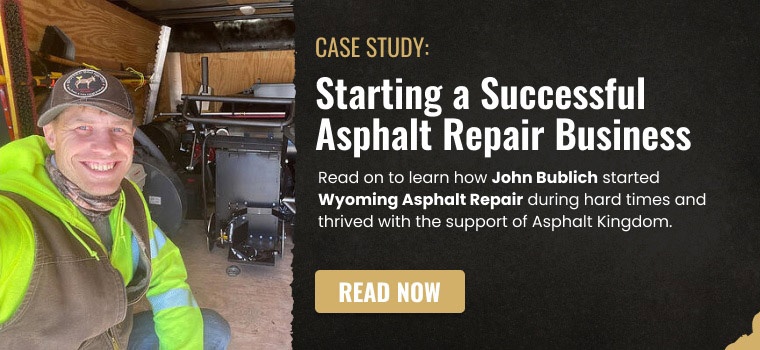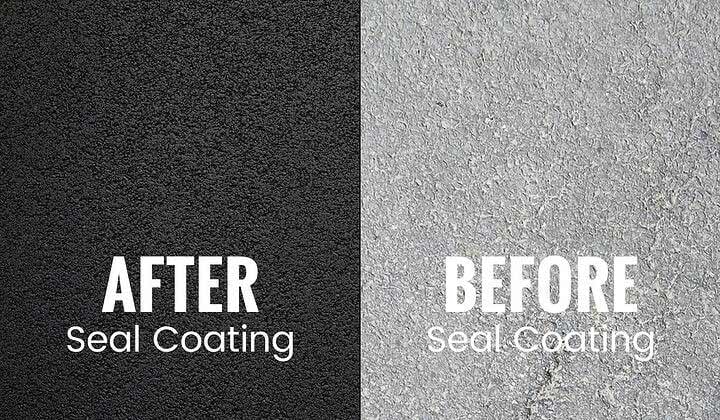Are you planning to enter the sealcoating industry this year or the next? Then, congratulations because you'll be joining a billion-dollar industry that is forecasted to grow at a pace of 4% in the next few years.
FREE COURSE!

HOW TO START YOUR OWN ASPHALT BUSINESS
Sign up for our free Create Your Own Asphalt Business Course
You will get instant access to all the days in the guide when you confirm your email address.
Table of Contents
- Make an Objective Assessment of Yourself and Why You Want to Learn How to Start a Sealcoating Business
- Conduct Thorough Market Research
- Craft a Good Business Plan Before Starting a Sealcoating Business
- Come up With a Unique Name for Your Sealcoating Business
- Choose the Appropriate Legal Business Entity
- Fund Your Sealcoating Business
- Open Your Sealcoating Business Bank Accounts
- Learn Everything You Can About Business Accounting and Taxation
- Get the Right Business Insurance
- Obtain Your Business Permit and License
- Invest in Top-Of-The-Line Sealcoating Equipment and Supplies
- Create a Distinct Brand Identity
- Create the Best Website You Can Afford
- Introduce Your Sealcoating Service to Friends and Family
- Can’t Keep up With the Demand? Hire Your First Staff
- Conclusion
But running a sealcoating business is no picnic. It involves hard work – a lot of it.
Most of the time, you'll be on your feet applying sealer on people's driveways and parking lots under the scorching heat of the summer sun. At the end of a very busy day, during the peak season, you're probably too tired to interact with your family or go out for drinks with friends.
But unlike other business ventures, sealcoating has a relatively low barrier to entry. It's profitable and crisis-resistant. Plus, you don't need a degree to become a sealcoater.
All you need is the knowledge of how to apply asphalt sealer properly, the drive, and the savviness in marketing and sales to make your business venture a success.
But there's a roadblock.
The thing is, you're not familiar with this whole set-up-a-business process. You're the first one in your family to potentially start your own business, and you're lost.
Maybe you're a teacher or a veteran, or you've worked retail and you're looking to switch careers.
You don't know one thing about how to start a sealcoating business.
If you're in this position, then this Asphalt Kingdom blog is for you. Read about our tips for success for up-and-coming sealcoaters below.
1. Make an Objective Assessment of Yourself and Why You Want to Learn How to Start a Sealcoating Business
The industry is full of people who ventured into the sealcoating business, thinking that they would be successful, but then ultimately failed.
There are a lot of factors along the way that can contribute to negative outcomes (supply chain problems, cash flow problems, etc.).
However, many entrepreneurs sometimes go into business without considering whether their personalities, skills, and experience suit the business they are venturing into.
So, before you take the plunge, we recommend that you sit down and think about why you want to become a sealcoater. Here are some questions you want to ask yourself.
Does the job suit your personality? For example, do you prefer working outdoors to being cooped up in the office from 9 to 5?
Can you charm people and convince them to purchase from you after making your pitch?
Are you fine with hard physical labor, or are you more of a "passive income" type of person?
Set aside some time to assess yourself objectively. Get a pen and a piece of paper, and list down all your skills, your strengths, and your weaknesses.
Next, evaluate why you want to go into this business. Money, of course, is a perfectly valid reason to get into sealcoating. After all, sealcoating is one of the most profitable property maintenance businesses right now.
But money is not nearly enough, especially when things get tough, and you need something intangible to motivate you to get up every morning.
Achieving financial independence and having a passion for helping property owners ensure their asphalt pavements last longer are keys to true success.
Having control over your own schedule and being with your family more often can also be a source of motivation that can drive you to strive and make your driveway sealcoating business a success.
Related: 6 Soft Skills Asphalt Maintenance Contractors Should Develop
2. Conduct Thorough Market Research
One of the most overlooked yet crucial stages of starting a sealcoating business is market analysis.
Market analysis is simply an assessment of an industry in a specific area. It enables up-and-coming sealcoating business owners like you to better understand your prospective customers, identify potentially lucrative markets in your area, and gauge customer willingness to spend on asphalt maintenance.
When conducting market analysis, you should also study other sealcoating businesses in the area, along with their strengths and weaknesses, to know whether you can compete with them or not. This is also a way for you to identify trends and issues in the sealcoating market.
Want to start market analysis today to jumpstart your sealcoating business? Then check out this article on conducting a thorough market analysis.
3. Craft a Good Business Plan Before Starting a Sealcoating Business
After researching your market and identifying your competitors, you are now ready to craft a good business plan.
A business plan is your road map for starting, running, and growing your sealcoating business. It will help you determine if your idea is financially viable, and it will help you create goals and set milestones for your asphalt maintenance business.
A good business plan helps you assess risks and reduce them, as well as develop the right marketing strategy for your company. Lastly, this document is a must-have if you're planning to secure funding for your sealcoating business.
If this is your first time writing a business plan, then check out this very helpful U.S. Small Business Administration guide.
Don't have time to tackle another piece of paperwork?
Then hire a business plan writer online via Upwork and other outsourcing websites. You can also commission one from a company that specializes in creating business plans.
4. Come up With a Unique Name for Your Sealcoating Business
You're done with all the initial paperwork (market analysis and business plan creation). Now, it's time for the fun part: coming up with a unique and meaningful company name for your sealcoating business.
Tips on choosing your company name:
Make sure your company name is unique by checking online if it is already taken. Several states have online databases made especially for checking business entity name availability.
Visit your state's business entities database to check if the name you have chosen is still available.
However, the information in these databases is limited to your state. Remember, you are still not allowed to use a registered business entity name even if the other company is located in another state. For a more comprehensive business name search, check the USPTO online trademark database.
Another easy way to check if a company name is already taken is to go to Google and conduct a thorough search. You can also do this on various social media platforms.
Choose a company name that is memorable, evokes positive emotions, and represents positive qualities (e.g., reliability, impressive workmanship, innovation, etc.).
Keep it simple and ensure that the company name is easy to remember. But sometimes, it's tempting to use a unique name to differentiate yourself from other sealcoating companies out there.
Don't use a company name that has a weird spelling. In addition, stay away from business names that your prospective customers have to Google again and again.
Don't have any company name ideas yet?
Feel free to use your first or last name. But again, make sure that the name is still available so as not to get into a problematic situation with another company that shares your first or last name.
5. Choose the Appropriate Legal Business Entity
It seems like a small thing, but the legal business entity or business structure you choose plays a crucial role in the success of your sealcoating business.
The business structure you choose will determine the amount of taxes you will pay, the financing options available for you, and your personal liability if things go south.
Read more about choosing the right legal business entity for your sealcoating business here.
Related: 5 Lucrative Opportunities Asphalt Maintenance Contractors Can Start Right Away
6. Fund Your Sealcoating Business
There are a few ways you can fund your sealcoating business. Take a look at your options below:
Bootstrapping
When it comes to bootstrapping, you have different options. You can dip into your own savings or 401(k), or borrow from family and friends.
Pros:
- Total control of your business
- Little to no debt (if you dip into your own savings or 401(k))
Cons:
- You can lose your savings if things go south
- Your capital is limited if you have modest savings
- The growth of your sealcoating business can be limited
Apply for a small business loan
There are several financial institutions where you can apply for a small business loan. These include private financing institutions via the U.S. Small Business Administration.
Check out this U.S. Small Business Administration page for a list of lenders in your state.
Pros:
- Interest rates are usually capped
- Offers great flexibility when it comes to eligibility
- You can apply for small or large loans
- Longer repayment period
Cons:
- It can take a long time to get approved
- You may be required to make a downpayment and provide a collateral
Asphalt Equipment and Supply Financing
You can also explore equipment financing via your chosen retailer. For example, here at Asphalt Kingdom, we partnered with Clicklease, Klarna, and Funding Booth to give up-and-coming sealcoaters a chance to finance their equipment and supplies on easy payment terms. Read about our asphalt equipment and supply financing program here.
Pros:
- No need for collateral
- Flexible payment plans
- Once approved, you can have the equipment shipped immediately
Cons:
- Higher interest rates
- You still need to shell out money or apply for a loan for other business expenses
7. Open Your Sealcoating Business Bank Accounts
Your old personal checking or savings bank account has been your trusty financial companion for many years. But if you want to safeguard your finances, you have to keep your personal and business bank accounts separate.
This is to help you track your business finances, organize your expenses with ease, and manage your cash flow.
Business bank accounts also have perks that you can take advantage of, including higher interest rates and lower fees.
Read this Asphalt Kingdom blog for a more in-depth look at why starting a sealcoating company means needing to have multiple business bank accounts.
8. Learn Everything You Can About Business Accounting and Taxation
It's important to learn everything you can about sealcoating and, eventually, crack filling.
But it's equally important to learn about the financial side of your business so you can track your expenses, manage your cash flow, budget accordingly, and prepare when tax season comes.
If you don't have a background in business or bookkeeping, you can take accounting and bookkeeping classes online or enroll in a short program offered by your community college.
9. Get the Right Business Insurance
After starting your sealcoating business, you'll find that many things can go wrong. Your equipment or vehicle could get stolen, or you or one of your crew could damage a property owner's car or get in a car accident.
That's why you need good business insurance, and you need one that is tailored specifically for your sealcoating business.
So, what type of insurance do you need? Here are a few things to consider.
- The type of business you own (in this case, it's sealcoating)
- The size of your sealcoating business
- The types of risks your asphalt maintenance business is exposed to
Read this blog for an in-depth discussion on asphalt maintenance insurance.
Related: Asphalt Maintenance Contractors: How to Stay Safe at Work This Summer
10. Obtain Your Business Permit and License
With all that out of the way, you can now apply to obtain your sealcoating business permits and licenses.
So, where do you acquire business permits and licenses?
Permits and licenses are granted by the state, county, or city where you operate. The rules and regulations on obtaining business permits and licenses vary by area, so contact your state, county, or city finance department to confirm.
Read more about obtaining sealcoating business licenses and permits in this Asphalt Kingdom blog.
11. Invest in Top-Of-The-Line Sealcoating Equipment and Supplies
Business permit and license granted? Then, congratulations on your new sealcoating business! It's now time to purchase your very first sealcoating equipment and supplies. Here's a handy guide.
Asphalt Sealer
The first thing on your list is asphalt sealer (also known as driveway sealer). We recommend getting and using asphalt emulsion sealer in your business as it doesn't chip or fade easily. It should also not contain pollutants and toxic chemicals like other types of sealers.
After starting a sealcoating business, you can purchase one 55-gallon drum of asphalt emulsion sealer here at Asphalt Kingdom just to see how it performs.
If you like its performance, then check out our asphalt emulsion skids and totes. We can also deliver bulk tanker loads right to your job site or headquarters.
Asphalt Sealer Additives
Want to speed up the sealer drying process or improve adhesion? Then, use driveway sealer additives. These products are useful when the amount of sunshine is limited in your area or when you are sealcoating at night.
Sealcoating Tools
Applying asphalt sealer requires special tools. These include a long sealcoat brush for easy sealer application, as well as drum and tote mixers.
Check out the Asphalt Kingdom sealcoating supplies store to learn more about additives, sealcoat brushes, and mixers.
Sealcoat Sprayer Machines
Asphalt Kingdom offers a wide selection of sealcoat sprayer machines available online and can be delivered right to your doorstep.
We have a sealer sprayer for drums, as well as tote sealcoating spray systems to jumpstart your business. These machines are made for new sealcoaters who have limited capital or simply wish to start out small and scale later on.
If you're willing to spend a little more on equipment when starting a sealcoating business, then check out our larger sealcoat sprayers. Choose the perfect machine for your business here.
Related: Choosing the Best Sealcoating Sprayer Tank Size For Your Business
12. Create a Distinct Brand Identity
Without a distinct brand or corporate identity, your company will just be another generic sealcoating business and won't stand out from the competition.
That's why we suggest that you work on your brand identity even before you start offering sealcoating services in your area.
What are the key elements of your sealcoating business brand identity? Check them out below.
Corporate typography
The font you use in your website, flyers, brochures, business cards, email, and other marketing collateral.
Tip: Corporate fonts should be unique to your company. But stay away from unconventional typefaces, such as Mistral, Monotype Corsiva, Jokerman, Kino MT, etc.
Your font should exude professionalism, be elegant, and be easy to recognize. Stick to tried-and-tested fonts such as Times New Roman, Helvetica, Bodoni, Garamond, Sabon, Proxima Nova, etc.
Company colors
What do McDonald's, The Home Depot, Qatar Airways, and Facebook have in common? All these companies have used corporate colors to ensure that their brands stand out.
If you're looking for examples that more closely align with someone wanting to start a sealcoating business, look no further than Asphalt Kingdom. We utilized the colors black and gold to ensure that our website and marketing collateral are unique, memorable, consistent, and have a connection to the company name.
Another example of the successful use of corporate colors is the asphalt maintenance company Black and Yellow Pavement. It's easy to remember the company name because it's named after two colors, namely black and yellow.
Learn more about how Black and Yellow Pavement, Inc. got started in the sealcoating business by watching the video below.
Video: Black and Yellow Pavement on starting a sealcoating business
Company logo
Apart from your brand's colors, your logo is one of the things that can make your company stand out.
However, choosing your company's logo is not as straightforward as choosing a color or brand font. You need to consult and brainstorm with your team and a good logo designer to pull this off.
Tip: Your logo should be relevant to your brand. Make sure that the customers immediately know what you're all about, even just by looking at your logo.
Read this article for a more in-depth guide on choosing a logo.
13. Create the Best Website You Can Afford
A good website allows your customers to find you online, connect with them, and allow your customers to book your services easily. In some instances, it can also be a good avenue to get paid.
To start, look for some of the most reputable and highly rated web developers in your area. You can also outsource it to freelancers online, but make sure to vet your candidates carefully. Check your candidates' portfolios and get a minimum of three quotes before you select the best candidate.
Think about what you want and write it all down in preparation for the brainstorming session. Create a detailed brief and a project plan for your web developer to follow.
Finally, make sure that the website is designed so that you or your staff can maintain it and that it can be expanded in the future.
14. Introduce Your Sealcoating Service to Friends and Family
As a new sealcoater, you'll often struggle to find customers willing to trust you with their driveways and parking lots. But there is an untapped group of people who will readily say yes to your service, so you can build your sealcoating "portfolio."
Who are they? Your family and friends!
To start, ask a couple of friends or family members if you could apply asphalt sealer to their driveways. If you have a friend who owns a commercial property, ask them if you could sealcoat a small section of their parking lot (don't apply sealer to the entire parking lot unless your friend pays you in full).
Be transparent when it comes to payment. Although you're willing to give them a discount, clarify that you still need to be paid. You are running a business, after all.
15. Can’t Keep up With the Demand? Hire Your First Staff
So, you finally have your first customers, and your business is thriving. Too many customers to juggle and need help? It’s time to hire your first sealcoating crew members.
A question that is probably bugging you is whether it's better to hire permanent workers or seasonal ones. Let's take a look at the pros and cons of hiring each type of worker.
Permanent Workers
Pros:
- Employees can focus on their jobs because they're not busy and stressed out looking for other jobs once the season ends.
- You have a more reliable workforce.
- You can retain good employees.
- Greater savings in the long run because you don't have to spend money training a new employee.
Cons:
- You have to pay benefits, including healthcare, holiday pay, and sick pay.
- You have to pay salaries even during slow days or when the season ends.
Seasonal or temporary workers
Pros:
- You can let them go once the season ends.
- Greater savings upfront because you don't need to pay for healthcare or sick days.
- You can let go of employees who are not performing well.
- You can hire students and seniors.
Cons:
- Temporary workers can leave your company when they find better opportunities elsewhere.
Conclusion:
Enjoyed these tips? Ready to start your sealcoating business? Then, check out our asphalt business packages here!
If you need additional information on starting your own sealcoating business, simply get in touch with us at 1-866-399-5562 or send us an email at sales@asphaltkingdom.com
Want Expert Business Advice? Check Out Our Asphalt Coaching













.jpg)